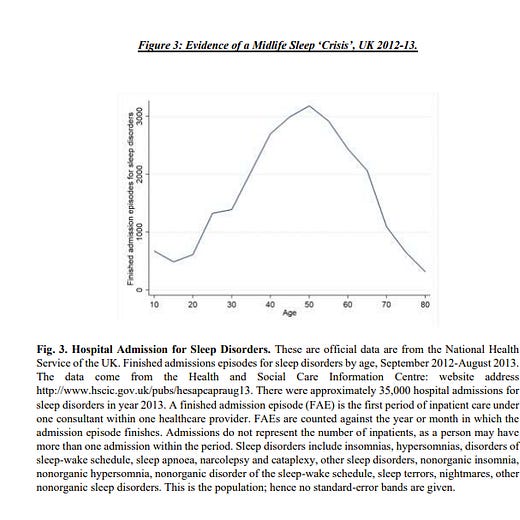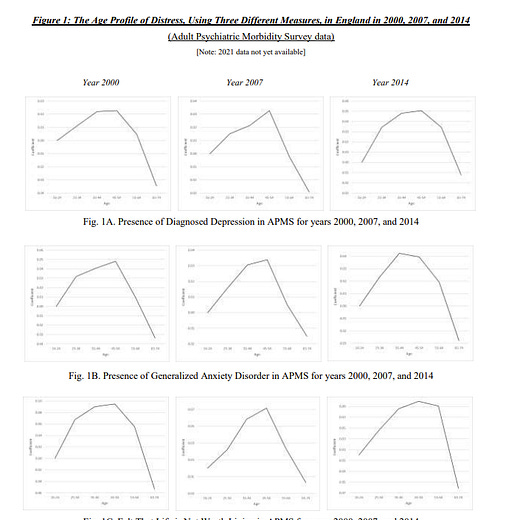Best of #econtwitter - Week of September 18, 2022 [2/3]
Sep 20, 2022
Welcome readers old and new to this week’s edition of Best of Econtwitter. Please submit suggestions — very much including your own work! — over email or on Twitter @just_economics.
This is part two of three.
Paper summaries

Osea Giuntella@Osea82
Using data on midlife suicide,sleeping problems, alcohol dependence, concentration difficulties, memory problems, intense job strain, disabling headaches, suicidal feelings, and extreme depression, we document a longitudinal crisis of midlife among the inhabitants of rich nations


1:29 PM · Sep 12, 2022
3 Reposts · 33 Likes

Vincent Delabastita@V_Delabastita
In our new paper, we quantify monopsony power for a uniquely long period (1845-1913), comparing the evolution of marginal revenue product of labor with actual wages (i.e. the ‘markdown’) paid to Belgian coal workers. (2/10)

12:08 PM · Sep 14, 2022
1 Like

Vincent Delabastita@V_Delabastita
No! Although some markdowns were imposed on workers, wages grew in close relation with the marginal product of labor during most of the 19th century. (5/10)

12:09 PM · Sep 14, 2022
2 Likes

Davis Kedrosky@dkedrosky
Hi everyone! @nunopgpalma and I have a new version of our paper—"The Cross of Gold: Brazilian Treasure and the Decline of Portugal"—out.
Comments and feedback (+amplification) welcome.
warwick.ac.uk/fac/soc/econom…

6:28 PM · Sep 13, 2022
50 Reposts · 210 Likes

Ollie Ballinger@oballinger
A project I’ve been working on for a while is out now as a CSAE working paper! It explores the relationship between droughts, irrigation, and insurgency in Southeastern Turkey. 1/11
ora.ox.ac.uk/objects/uuid:f…

2:35 PM · Sep 2, 2022
6 Reposts · 17 Likes

𝗡𝘂𝗻𝗼 𝗣𝗮𝗹𝗺𝗮@nunopgpalma
🔊What was the first regime in History able to deploy fiat standard as the sole legal tender?
✅It was the Yuan (1260–1368) dynasty in China!
The Mongols were not savages!
Find below all about it in our new paper! (joint with Hanhui Guan of Peking University & @MengWu_EcoHis)

10:37 AM · Sep 16, 2022
4 Reposts · 25 Likes

Jan Feld@EconFeld
Are women worse programmers?
Do employers believe they are?
Our new paper suggests the answers are
1)No
2)Yes (especially female employers!)
Silver lining: these false beliefs can be corrected with additional information.
#EconTwitter 🧵

11:42 PM · Sep 15, 2022
141 Reposts · 499 Likes

Evan Soltas@esoltas
New short paper with @ipogadog: We estimate that Covid-19 illnesses have reduced the US labor force by ~500,000 workers & provide the first representative estimates of Covid’s direct labor supply effects.
Paper: nber.org/papers/w30435

12:27 PM · Sep 12, 2022
341 Reposts · 703 Likes

Seema Jayachandran@seema_econ
Our paper that proposes and tests a new method for designing survey modules — by combining qualitative interviews and machine learning — is now out in @WorldDevJournal.
The application: survey module for measuring women's agency in India. doi.org/10.1016/j.worl…

12:58 PM · Sep 12, 2022
85 Reposts · 369 Likes

Ethan Mollick@emollick
The whole sad story of audience capture in a paper. Someone who unexpectedly has a post go viral:
1. Starts to post more
2. Makes their future posts more like the post that went viral, in an attempt to recapture the glory
3. Attention usually fades rapidly ojs.aaai.org/index.php/ICWS…

2:10 AM · Sep 15, 2022
38 Reposts · 240 Likes
Public goods

Kris Gulati@krisgulati
Slides/lecture material on economic theory and global prioritisation by (the great!) Phil Trammel docs.google.com/document/d/1df…

2:18 AM · Sep 14, 2022
1 Repost · 9 Likes

Devon ☀️@devonzuegel
just found an incredible resource to understand what parts of the USA are friendly to development: @Wharton's Residential Land Use Regulatory Index
the raw data was a hard to navigate, so I put it in a spreadsheet & annotated it to make it easier:
docs.google.com/spreadsheets/d…

10:49 PM · Sep 18, 2022
31 Reposts · 276 Likes

David Schindler@DSchindlerEcon
🚨🚨 @cp_roth and I have provided a resource collection for econ grad students: sites.google.com/view/econgrada… which we will keep updating and hope you find it helpful!
👉👉 Now we need your input: What other public good would be helpful? Please respond to tweet or DM!
sites.google.com
EconGradAdvice
7:46 PM · Sep 18, 2022
113 Reposts · 443 Likes
Interesting discussions

Jake Vigdor@JakeVigdor
Folks talking about the timing of the AEA meetings on #econtwitter: there's some fascinating historical trivia in this 2008 John Siegfried article on the history of the meetings. And some clues that maybe it's time to switch to a summer meeting...🧵
jstor.org/stable/2773974…

11:05 PM · Sep 17, 2022
7 Reposts · 34 Likes

Arpit Gupta@arpitrage
Prediction: <5% of academic institutions will hold in-person interviews at ASSAs. The vast majority will do so virtually, into the foreseeable future.
As a consequence, attendance at the ASSA/AEA will fall. Generally a bad time of year/place in country to host a conference.

Jake Vigdor @JakeVigdor
AEA continued to hold a *separate* job market meeting in January. Attendance (& registration fees!) declined considerably. Turns out a lot of people register for the meeting and go to few if any sessions. During any given concurrent session time slot 75% of registrants are AWOL! https://t.co/WUFdCuM50m
11:17 PM · Sep 17, 2022
1 Repost · 25 Likes

Seema Jayachandran@seema_econ
Now that JM interviews are decoupled from the AEA mtgs, why not coordinate on flyouts only starting in late Jan? Many univs are on winter break until then. Plus this helps the mkt clear sequentially, e.g., MIT's flyouts aren't "late" anymore. Market would still end before April.
10:59 PM · Sep 18, 2022
34 Likes

